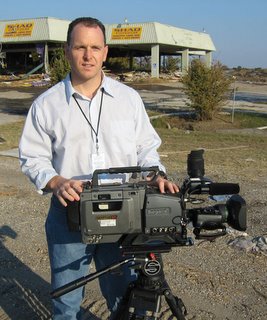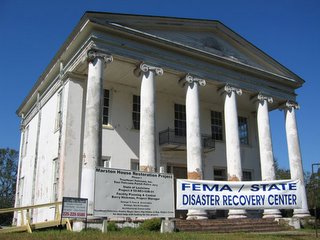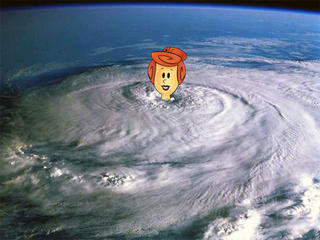Monday, October 31, 2005
Roadblocks
Yup. Bulldozers needed. In some places they can just let it rot. No one's coming back. In southwest Cameron Parish, entire towns were wiped off the Earth by Hurricane Rita.
I'm based in Baton Rouge, about 80 miles northwest of New Orleans. So it's relatively normal here but I'll be traveling all over the state to shoot stories. Some of the southernmost parishes have roadblocks you have need special permission to pass. Our ID badges should gain us admission.
We've had enough roadblocks inside the bureaucracy we deal with. The mission for the Recovery Channel is supposed to be to serve the evacuees. That may be so but our liasons often want particular officials included for political reasons. This person or that needs to be included in an on-camera interview, I'm told. Does it make the story more relevant to someone left homeless and jobless by the storm? No but it will make someone happy somewhere and it's clear that this is the real mission.
That's the sad part. The funny part is that we're told to include these elements and then the people we're supposed to interview are not available.
But the Recovery Channel can be a useful venture and I'll keep pushing to make sure it is.
Sunday, October 30, 2005
Picture Day
So I ask, "Where are we going?"
Maybe they'll get it someday. But not today. So I looked at a map, picked a parish near the gulf, called the field PIO (Public Information Officer) for that area and went to shoot video of destruction that we'll use to illustrate stories we do later.

The pictures are from Slidell and Eden Isle in St. Tammany Parish. That's in the southeastern-most part of the state. The parts that the Gulf did not swallow went under water from Lake Ponchartrain.
The picture with the toilet sitting on top of a home's foundation, the concrete slab being the only thing left once the house blew into the water behind it. Look closely at the background and you can another home stripped down to its frame.
 Eden Isle, where I took the above shot, is home to upscale lakefront houses and condos, proving that Katrina was an equal opportunity offender. The picture to the left shows photographer Jan Brown shooting a house. That gives you some perspective on the scale of damage to it. The last shot shows me standing with our camera where we stopped to shoot more video along Route 11 between Slidell and Eden Isle.
Eden Isle, where I took the above shot, is home to upscale lakefront houses and condos, proving that Katrina was an equal opportunity offender. The picture to the left shows photographer Jan Brown shooting a house. That gives you some perspective on the scale of damage to it. The last shot shows me standing with our camera where we stopped to shoot more video along Route 11 between Slidell and Eden Isle.
Here's the thing the pictures don't show: It's not that you see damage. It's that you don't see anywhere there is no damage. 
We came back to Baton Rouge through New Orleans. Block after block you see water lines. Home after home, business after business, all ruined. Some places had portable storage units sitting outside. Some stuff inside can be salvaged but a good portion of the city not destroyed by the storm (No one says its name; it's simply "The Storm.") will have to let bulldozers do them in.
We drove through part of the French Quarter. It escaped heavy damage but it still looked terrible. Maybe that's how it always looked. Even the better parts of town look soiled now. And when it gets dark the smell reminds you of the rotting you can't see
Saturday, October 29, 2005
Travel Trailer City
Wonda Bouffine has stuck fake flowers into the ground in front of her trailer. Don't plant real ones, she was told. She understands. No one is supposed to put down roots here. "We're only here temporarily 'til we get settled," she says.
Wonda was not the only resident to bend my ear today. Nevermind that I'm only a contractor working as a reporter for FEMA's new Recovery Channel, carrying a microphone and everything. Because I have a FEMA credential, someone thinks it's my fault that their heater doesn't work.
One woman had a posterboard with what she said was a partial list of unit numbers plagued by malfunctioning heaters or septic systems. Later a snaggle-toothed bleach blonde, who might have been attractive if only she had ever learned the value of flossing, accosted me to complain that FEMA had yet to pay off on her application for aid.
What do you do? I stood there and tried to listen sympathetically, figuring I would wear them down with non-commital nods.
Most people we met weren't angry. Why would they be. Two weeks ago, most were still sleeping on a floor somewhere with hundreds of their closest strangers. A private trailer with working water, heat and appliances must have seemed like paradise to some of them. Evacuees staying at travel trailer shelters FEMA has set up.
Unfortunately I spent so much time trying to extricate myself from conversations unsuccessfully that I didn't have time to stop and take any pictures. I've got to make a point of keeping my camera ready.
Shock of shocks, the FEMA PIO leader signed off on the script I wrote about Disaster Recovery Centers. I was sure that she'd want to suck every bit of the human-interest out of it but she only asked me to add a few details about the program.
John's Gulf Journal
I'm going to try to detail my days in Louisiana on a separate blog called -- are you ready? -- John's Gulf Journal.
See you there.
Deployed
Based on the first two days, the biggest challenge won't be telling the stories, it will be working under the weight of federal bureaucracy. It's a culture in which deflection is the better part of valor, in which taking action involves taking risk which is to be avoided at all costs. Let's have another meeting instead. There must be someone else who can find another obstacle that will give us an excuse to put things off until we can meet again tomorrow.
That means that the story we shot today might never air because it didn't acquire the double secret permission apparently required before we did it.

Clinton, Louisiana is about 30 miles north of our base in Baton Rouge. They had opened a Disaster Recovery Center inside an antebellum mansion called the Marston House. The place had been pressed into public service before. It was used as a hospital during the civil war and then served as offices for administering New Deal programs during the Great Depression.
Wednesday, October 26, 2005
Going Away
Because it's a government project, it had to ooze its way through untold layers of bureaucracy before we got the green light. It sounded so disorganized and -- frankly, because of the pay rate, too good to be true -- that I had taken the tact that I'd believe it when I saw the sign welcoming me to Mississippi.
We should pass it sometime late tomorrow. I got the call today that we were on.
I don't know exactly what I'm getting into. The only sure thing I know is that we have to produce ten minutes of material a day. That's a tremendous amount for a two-person crew to generate. In TV news, such a crew would be responsible for two minutes a day. That's a worry.
There's a lot else I don't know. Where we're going to sleep, for one. Far down the list of uncertainties is whether I'm going to have any access to the Internet or, considering the intensity of the assignment, any time left for blogging.
If you don't hear from me for six weeks, that's why. Otherwise, I might set up a separate blog to detail my Gulf odyssey.
Monday, October 24, 2005
Voices
"I'm up for it if you are," he said. I was and we were.
Driving to the production company's offices in St. Petersburg entails crossing Tampa Bay over the Howard Frankland Bridge. Though the eye of Hurricane Wilma had passed well south of us several hours ago, the winds were still strong enough to bounce my car around the road. Whitecaps rolled everywhere on the water. The bay looked as if it were confused, frantically sending waves in so many directions at once.
Water splashed on my windshield. I thought I had driven into a rain squall until I realized that it could not have fallen from the cloudless sky. It had blown off the bay onto my car. Come to think of it, I better get the car washed. Salt water can't be good for it, especially in such large doses.
But it survived the trip without apparent effect. It was cool enough outside that I could eschew my usual strategy of looking for the shadiest parking spot rather than the one closest to the door and I parked directly in front of the office.
Doing voice-over work can be tricky when it's work someone else has written. One of the byproducts of my broadcasting career is that when I read anything I hear the words in my head.* But the voice inside my head might not sound like the one the producer has in mind. My job is to try to read the words the way the producer hears them in his head -- even if I don't particularly like how they sound there.
I was narrating three stories about the Katrina recovery effort in the Mississippi Gulf Coast. They weren't vastly different from what you'd expect to see in a normal TV news story except they were a lot longer so I should not have been too far out of my comfort zone.
Once we'd set up and started recording, I'd read a section and look over at him. At first he often asked for another take. It took awhile to understand how he wanted it to sound. He said he wanted "conversational," but as we went along I realized that what he meant was that he wanted a delivery like you'd hear on NPR. I can do that but the imperious drone you hear on public radio is no more conversational than the affected news voice Brian Williams uses as he poses for you on NBC.
After a take, A head nod meant "close enough." An emphatic head nod meant that I had read it exactly as he had hoped to hear it. And the one time he nodded and tilted his head at the same time he told me he hadn't thought of it sounding that way but liked it better than what he had imagined. Words work funny that way.
The whole thing took about 90 minutes and I was back in my car braving the wind after making profitable use of my windpipe.
*It will hearten you to hear that after much practice I have conquered the need to move my lips while reading.
EXCLUSIVE!
The Beatles'
UNTOLD STORY
The words blared across a black and white image of the Fab Four on this month's Reader's Digest. Come on. It's 2005. Are there really any untold stories about the Beatles left? If so it's because they're not worth telling.
Just so you know, I did not buy the RD in question. But I did peek inside to see that it contained such revelations as that the Beatles once had a drummer named Pete Best and that they replaced him with another drummer called Ringo Starr.
I hope I didn't spoil your surprise.
Sunday, October 23, 2005
Branding
Station managers would say that they were ensuring the safety of their viewers by providing critical information about a potentially dangerous storm. Their true motive is less altruistic. The cut-ins, split screens and alerts crawling across the picture are designed less to transmit information and more to reinforce a brand.
Stations are willing to risk annoying viewers to convince them they're "on your side," "taking action for you," or that "we've got you covered" so that you might watch their newscasts. It would be like going to a restaurant and ordering a steak only for the waiter to remind you again that the day's special is fish.
Why do they do that? Simple. Stations make a lot more money from their local newscasts than they do from network programs. They'll weather the storm of angry callers for the sake of using popular shows to promote their storm coverage.
That's why we need federal intervention to restore our rights as Americans to watch football games unimpeded by the profit motives of local stations. I'm kidding about that but jeez.
Saturday, October 22, 2005
Wilma!
I am fascinated by watching hurricane coverage and amazed at the pictures that new technology allows us to get of these storms.
 Incredible, huh? It's almost like the storm has a recognizable face. If we're lucky, Wilma will veer south and hammer Cuba instead. I don't particularly dislike Cuba but if the choices for who is going to lose electricity for a week are me and Fidel Castro, I'm going to let the communist dictator live without refrigeration or air conditioning.
Incredible, huh? It's almost like the storm has a recognizable face. If we're lucky, Wilma will veer south and hammer Cuba instead. I don't particularly dislike Cuba but if the choices for who is going to lose electricity for a week are me and Fidel Castro, I'm going to let the communist dictator live without refrigeration or air conditioning.I'm sure on his blog he says the same thing about me.
Friday, October 14, 2005
Lawn Mower Therapy
I am not kidding. There may be few activities more mentally freeing than mindlessly walking in step, row after row, to the drone of the mower's motor. If I could write while doing it, this space would have a lot more content. Thoughts come in torrents as I push that little machine around the yard.
For someone who enjoys daydreaming as much as I do, it is a wonderful diversion that accomplishes something at the same time. Unfortunately (for me -- you might be happy about it), I never remember more than vague hints of my ethereal escape and, thus, can't share them here.

